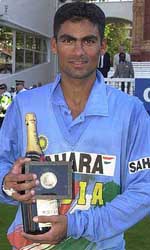The NatWest Series, 2002
Lawrence Booth
|
|

|
This tournament was defined by one game. Fortunately, that game was the final. Before the third NatWest Series got under way, India's only previous one-day meeting with England at Lord's had been the notorious World Cup game of 1975. On that occasion, Sunil Gavaskar had responded to England's 334 for four by batting out 60 overs for 36 runs as India crawled to 132 for three. This time, England passed 300 once more, only to have the trophy wrenched from their grasp by two innings of audacious brilliance from Yuvraj Singh and Mohammad Kaif, whose combined age of 41 was just two more than the England wicket-keeper, Alec Stewart. Not since November 1998, when they beat Zimbabwe in the Coca-Cola Champions Trophy at Sharjah, had India won a one-day final. It had taken ten bites at the cherry, and - with memories of Andrew Flintoff 's bare-chested rampage round Mumbai's Wankhede Stadium in February still fresh in Indian minds - tasted all the sweeter for it.
It was a fairytale finale. A story circulated that back in Allahabad, when India crashed to 146 for five, Mohammad Kaif's parents had given up all hope and disappeared to the cinema, only to discover later that their son was a hero. The 20-year-old Yuvraj Singh, a powerfully built left-hander with the eye of an eagle, proved a big hit too. For the third time in the series, he had averted an Indian crisis, and he ended the third-highest run-scorer, with 254.
For whatever reason, it was quite a series for left-handers. Marcus Trescothick bludgeoned 362 runs at the frightening strike-rate of nearly 108 and played three memorable innings: 86 off 78 balls in the group game against India at Lord's, 82 off 60 to inspire a stunning victory over Sri Lanka at Headingley, and 109 off 100 in the final. The leading wicket-taker was the Indian left-arm seamer, Zaheer Khan, with 14, while Chaminda Vaas, Sri Lanka's left-arm opening bowler, was joint third with nine. Even the most economical front-line bowler was a left-hander: Ashish Nehra of India conceded just 4.16 per over.
But it was the unrivalled flair and depth of the Indian batting - Kaif was a regular at No. 7 - that helped them win five of their six completed matches. They were aided by pitches which, with the exception of Edgbaston, encouraged strokeplay. Familiar concerns about facing the white ball in English conditions failed to materialise, and the average 15-over score was a more-than-healthy 85 for two. Only once, when England were chasing a big Sri Lankan total at Headingley, did a side lose more than three wickets in the first 15 overs.
England's passage to Lord's was built around a nucleus of seven players - Trescothick, Nick Knight, Nasser Hussain, Paul Collingwood, Stewart, Flintoff and Ronnie Irani - who appeared in every game. Flintoff finally lived up to the hype on home soil with 190 runs at a strike-rate of 129 and nine wickets, while Irani made up for his lack of natural flair with sheer guts to turn in the performance of a lifetime at The Oval. But doubts continued to surround the role of Hussain, who managed just 129 runs at less than 26 and a strike-rate of 66 before his cathartic century from the controversial No. 3 position in the final. And with Caddick injured, Gough not fully fit and Hoggard lacking in confidence, England often missed a consistent bowler at the death.
Sri Lanka, demoralised after losing the Tests 2-0, barely showed up. For them, this felt like a series too far, and their chances of reaching Lord's vanished with three group matches still to go. Jayasuriya and, briefly, Sangakkara sparkled with the bat, but the absence of the injured Muttiah Muralitharan cost them dear. The ten-game format would have worked better had Sri Lanka not taken until their fifth match to win, but the jury was still out on the day/night experiment in England, mainly because only three were played under lights, one of which was rained off. In any case, the three most gripping games - India's two wins at Lord's and England's enthralling run-chase at Headingley - were played in daylight. In the end, Yuvraj and Kaif dazzled all by themselves.
Match reports for
England v Sri Lanka at Nottingham, Jun 27, 2002
Report |
Scorecard
England v India at Lord's, Jun 29, 2002
Report |
Scorecard
India v Sri Lanka at The Oval, Jun 30, 2002
Report |
Scorecard
England v Sri Lanka at Leeds, Jul 2, 2002
Report |
Scorecard
England v India at Chester-le-Street, Jul 4, 2002
Report |
Scorecard
India v Sri Lanka at Birmingham, Jul 6, 2002
Report |
Scorecard
England v Sri Lanka at Manchester, Jul 7, 2002
Report |
Scorecard
England v India at The Oval, Jul 9, 2002
Report |
Scorecard
India v Sri Lanka at Bristol, Jul 11, 2002
Report |
Scorecard
Final: England v India at Lord's, Jul 13, 2002
Report |
Scorecard

